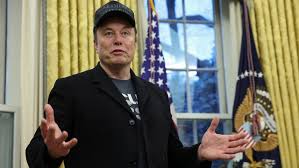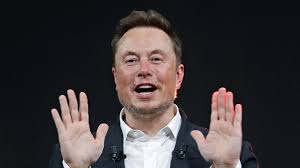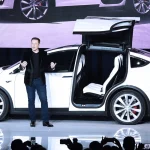Elon Musk’s $90M Power Move: Homes for the Struggling!

Elon Musk’s $90M Power Move: Homes for the Struggling!
In a surprising and impactful turn of events, Elon Musk has committed a massive $90 million toward funding affordable housing projects for families in need. Known for his ambitious ventures in technology, space exploration, and sustainable energy, Musk has now set his sights on tackling one of the most pressing issues of our time: housing insecurity. This bold and unexpected donation has captured widespread attention, signaling a shift in Musk’s philanthropic approach and his growing recognition of the power his wealth holds to address societal challenges.
With rising rents, skyrocketing home prices, and a global housing crisis affecting millions, Musk’s $90 million donation is being hailed as a timely and significant intervention. It not only promises to provide homes for the struggling but also demonstrates Musk’s increasing willingness to leverage his resources for social good. Musk’s move has already sparked discussions about how billionaires can use their wealth to address systemic issues, especially those that affect low-income communities around the world.
A $90 Million Commitment to Affordable Housing
Elon Musk’s $90 million donation will be directed toward the construction of affordable homes for families who are struggling to find stable, secure housing. The donation will focus on areas where the housing crisis is particularly severe, including major cities with high demand for affordable living spaces. Musk’s initiative aims to offer families the opportunity to own or rent homes at affordable prices, providing them with long-term stability and a pathway to a better future.
The homes will be designed with sustainability in mind, using Tesla’s renewable energy technologies, such as solar panels and energy storage systems, to lower utility costs for residents. By incorporating energy-efficient solutions into the housing projects, Musk is ensuring that the homes not only address the immediate need for affordable housing but also help reduce long-term energy costs for families, many of whom struggle with high electricity bills. This commitment to sustainability reflects Musk’s broader vision of using technology to solve global challenges, and it ensures that the homes will be environmentally responsible as well as affordable.
Additionally, Musk’s vision includes creating entire communities rather than just standalone homes. These communities will be built with access to critical services, such as education, healthcare, and public transportation, ensuring that families have the resources and opportunities they need to thrive. This holistic approach to community development underscores Musk’s belief that affordable housing should be part of a broader effort to address the social determinants of health and well-being.
Musk’s Expanding Role in Philanthropy
While Elon Musk is known for his groundbreaking work with Tesla, SpaceX, and other ventures, his $90 million housing donation signals a deeper commitment to philanthropy. Over the years, Musk has made some charitable contributions, including donations to educational initiatives and environmental causes, but his direct involvement in affordable housing marks a significant shift in his philanthropic efforts.
Historically, Musk has focused more on using his businesses to drive change rather than making traditional charitable donations. His donation to housing projects represents a more hands-on approach to philanthropy, reflecting an evolving perspective on the responsibilities of billionaires in addressing societal issues. Musk’s growing interest in philanthropy and social responsibility may inspire other wealthy individuals to use their resources to tackle global problems like housing, poverty, and inequality.
While Musk’s donations have often aligned with his business ventures—such as his work with clean energy and space exploration—this $90 million donation is a more direct and targeted contribution. It is an acknowledgment of the role that private-sector wealth can play in solving problems that governments and public institutions often struggle to address. Musk’s efforts may be the catalyst for a broader movement in which the wealthiest individuals use their resources to create long-term, sustainable change in areas like affordable housing.
The Housing Crisis: A Growing Global Issue
The need for affordable housing is at a critical point, especially in urban centers where the demand for housing far exceeds the supply. In cities like San Francisco, New York, and London, housing costs have skyrocketed, making it increasingly difficult for low- and middle-income families to find affordable homes. The COVID-19 pandemic only exacerbated these challenges, leading to higher unemployment and economic instability for many families. According to the National Low Income Housing Coalition, there is a shortage of over 7 million affordable rental homes in the United States alone, highlighting the scale of the crisis.
Musk’s $90 million donation will help fill part of this gap, providing affordable homes for families who would otherwise be unable to secure stable housing. While $90 million is just a fraction of the total investment needed to address the global housing shortage, Musk’s contribution is significant, especially given the private-sector focus of his donation. It will provide much-needed relief to thousands of families and serve as an example of how wealthy individuals can make a direct and meaningful impact on social issues.
In addition to providing homes, Musk’s project is likely to spark broader conversations about the role of the private sector in solving systemic social problems. If successful, Musk’s initiative could pave the way for other billionaires and corporations to follow suit, providing additional resources and innovation to tackle the housing crisis on a larger scale.
The Challenges of Affordable Housing Projects
While Musk’s $90 million donation is commendable, the challenges of solving the affordable housing crisis remain significant. The cost of construction, land acquisition, and infrastructure development can be prohibitively high, particularly in areas where demand for housing is greatest. In addition to the financial hurdles, regulatory and zoning barriers can delay or complicate the construction of affordable housing.
Despite these challenges, Musk’s track record of overcoming obstacles in other industries—such as electric vehicles, space exploration, and renewable energy—suggests that he may be able to overcome the difficulties involved in large-scale housing development. His innovative approach to solving complex problems, combined with his ability to rally support from other tech industry leaders, gives him the potential to make a significant impact on the housing crisis.
Another potential challenge is the long-term sustainability of the homes. While integrating sustainable energy solutions can lower utility costs for residents, the upkeep and maintenance of the homes will require ongoing investment. Musk’s housing initiative will need to ensure that the homes remain affordable and well-maintained for the long term, which will require collaboration with local governments, nonprofit organizations, and other stakeholders.
The Broader Impact: Inspiring a New Era of Philanthropy
Musk’s $90 million donation has the potential to inspire other billionaires to consider how they can use their wealth to address pressing global issues. The idea that private sector investment can play a key role in addressing the housing crisis challenges traditional views of philanthropy, where government intervention has often been seen as the primary solution. Musk’s donation is a bold statement about the role that billionaires can play in solving complex social problems, and it could encourage others to think beyond traditional corporate goals and consider how their resources can make a meaningful difference in society.
In addition to addressing the immediate need for affordable housing, Musk’s initiative could lay the groundwork for future developments in housing and community planning. By using advanced technologies and focusing on sustainability, Musk is showing that it is possible to create affordable homes that are also environmentally responsible. This could become a blueprint for future housing projects, making them not only affordable but also energy-efficient and resilient in the face of climate change.
Conclusion: A Step Toward Solving the Housing Crisis
Elon Musk’s $90 million donation to affordable housing is a transformative initiative that has the potential to improve the lives of thousands of families. By combining sustainability, innovation, and philanthropy, Musk is demonstrating that billionaires can use their resources to solve pressing social issues. While challenges remain in addressing the scale of the global housing crisis, Musk’s donation is a significant step forward and a powerful example of how the wealthiest individuals can contribute to creating a more equitable and sustainable future.
As Musk continues to expand his philanthropic efforts, his $90 million housing initiative could serve as a model for others to follow. Whether or not this marks the beginning of a larger trend in tech philanthropy, it is clear that Musk’s growing commitment to social responsibility is making a real difference in the fight against housing insecurity. His vision of providing “homes for the struggling” is one that could shape the future of affordable housing, offering hope to those in need and inspiring others to take action.









